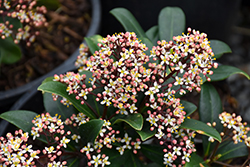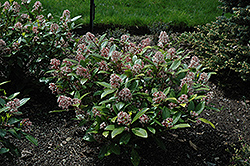It's all about ...
plants

Rubella Japanese Skimmia
Skimmia japonica 'Rubella'
Height: 3 feet
Spread: 3 feet
Sunlight:
![]()
Hardiness Zone: 7b
Description:
A compact male variety with glossy green narrow leaves and panicles of sweetly fragrant white-pink flowers in spring; excellent for low borders and containers
Ornamental Features
Rubella Japanese Skimmia features showy clusters of fragrant white flowers with pink overtones at the ends of the branches in mid spring, which emerge from distinctive red flower buds. It has attractive dark green evergreen foliage. The glossy narrow leaves are highly ornamental and remain dark green throughout the winter.
Landscape Attributes
Rubella Japanese Skimmia is a multi-stemmed evergreen shrub with a mounded form. Its average texture blends into the landscape, but can be balanced by one or two finer or coarser trees or shrubs for an effective composition.
This shrub will require occasional maintenance and upkeep, and should only be pruned after flowering to avoid removing any of the current season's flowers. It has no significant negative characteristics.
Rubella Japanese Skimmia is recommended for the following landscape applications;
- Accent
- Mass Planting
- General Garden Use
- Container Planting
Planting & Growing
Rubella Japanese Skimmia will grow to be about 3 feet tall at maturity, with a spread of 3 feet. It has a low canopy. It grows at a slow rate, and under ideal conditions can be expected to live for approximately 30 years.
This shrub should be grown in a location with partial shade or which is shaded from the hot afternoon sun. It prefers to grow in average to moist conditions, and shouldn't be allowed to dry out. It is not particular as to soil pH, but grows best in rich soils. It is somewhat tolerant of urban pollution. This is a selected variety of a species not originally from North America.
Rubella Japanese Skimmia makes a fine choice for the outdoor landscape, but it is also well-suited for use in outdoor pots and containers. Because of its height, it is often used as a 'thriller' in the 'spiller-thriller-filler' container combination; plant it near the center of the pot, surrounded by smaller plants and those that spill over the edges. It is even sizeable enough that it can be grown alone in a suitable container. Note that when grown in a container, it may not perform exactly as indicated on the tag - this is to be expected. Also note that when growing plants in outdoor containers and baskets, they may require more frequent waterings than they would in the yard or garden. Be aware that in our climate, most plants cannot be expected to survive the winter if left in containers outdoors, and this plant is no exception. Contact our experts for more information on how to protect it over the winter months.
This plant is not reliably hardy in our region, and certain restrictions may apply; contact the store for more information.

